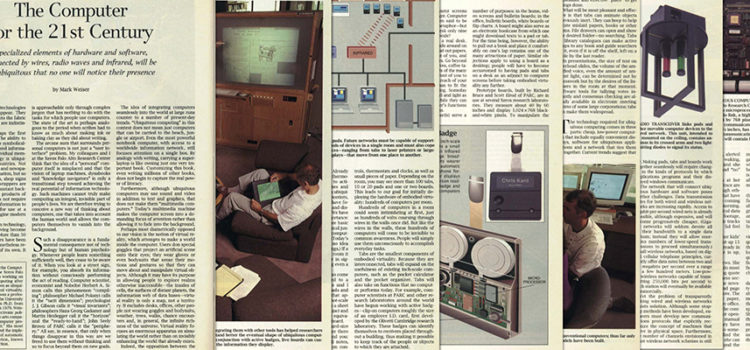Ilias Kurs Wiki
TactiFloor akzeptiert für MUM 2017
Unser Poster zu “TactiFloor: Design and Evaluation of Vibration Signals for Doorway Reminder Systems” wurde zur Veröffentlichung auf der International Conference on Mobile and Ubiquitous Multimedia akzeptiert. Die Publikation ist ein Ergebnis der Arbeit von Daniela Reschke und Manuel Sorg
Call for Papers: UbiTtention 2017
2nd International Workshop on Smart & Ambient Notification and Attention Management September 11 or 12, 2017 in Maui, Hawaii, USA in conjunction with ACM UbiComp/ISWC 2017 https://projects.hcilab.org/ubittention2017/ June 9, 2017 (Submission deadline) June 30, 2017 (Notification deadline) July 7, 2017
WPF Ubiquitous Computing (WS16/17)

Ubiquitous Computing ist ein technologisches Paradigma, das von einer fortschreitenden Durchdringung unseres Alltags mit digitalen informationsverarbeitenden Einheiten ausgeht. Dieses WPF verfolgt einen forschungs-orientierten Ansatz: Nach einer Einführung in das Thema durch den Dozenten erarbeiten die Teilnehmer in Teams eigene forschungs-orientierte Ideen, die sie in seminaristischem Unterricht und Projekten umsetzen.
Call for Papers: UbiTtention 2016
Users of digital devices are increasingly confronted with a tremendous amount of notifications that appear on multiple devices and screens in their environment, such as at smart homes, smart offices, smart cities, and smart mobile environments. It becomes obvious that intelligent attention management systems and alternative, for example ambient, representations of incoming notifications are needed.
The goal of this workshop is to discuss how the problems of information overload and overchoice can be solved. In the era of the Internet of Things (IoT) we have to handle incoming notifications from all our devices, and together with developments in smart city environments or with smart mobility the information overload will grow. In this workshop we want to focus on a larger understanding of the different roles notifications can play in a wide variety of computing environments including the office, the home, in cars, and other smart environments.
We solicit original, unpublished, technical papers in the areas relevant to the above topics, including, but not limited to: understanding mobile information needs, mobile notifications, mobile attention behavior, detection/prediction of availability and attention, detection/prediction of information perception, information overload, multimodal interaction with focus on attention optimization, interaction across devices, multi-device interaction, frameworks and tools for the development of smart attention systems, ambient notifications.
